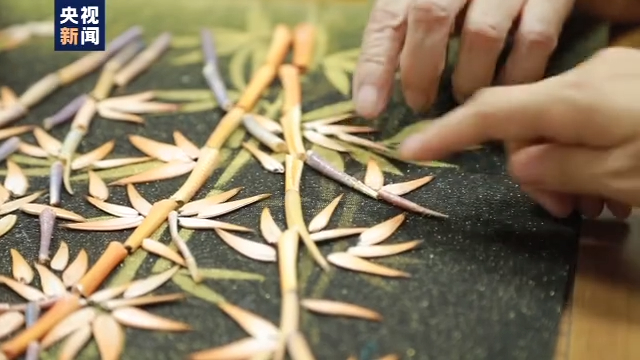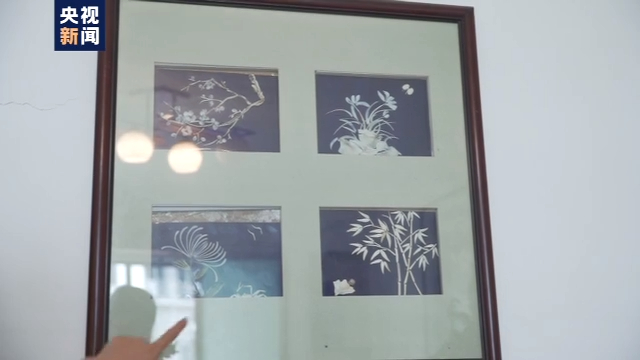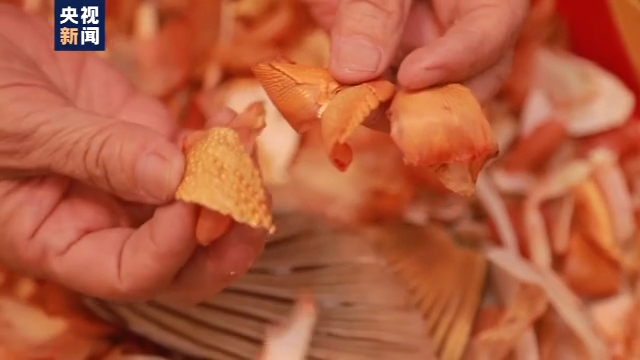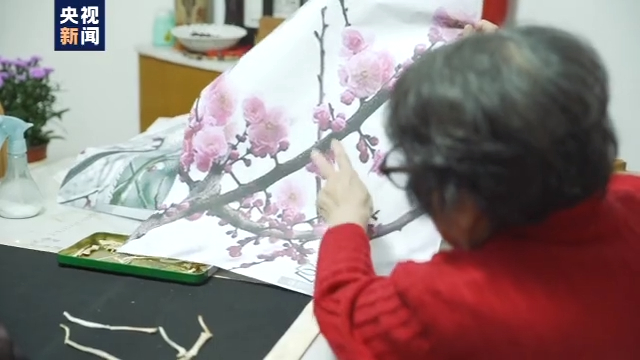

Recently, a special series of artworks have attracted the attention of many at an art exhibition in Hangzhou city, capital of east China’s Zhejiang province. No ordinary paintings, they are made by Gao Siji, a 88-year-old grandmother who lives in the city, using kitchen waste such as fish bones and crab legs.

(Photo/cctv.com)
Coming up with the idea while eating fish, she discovered the shape of the fishbone looks similar to the petal of a chrysanthemum and tried to construct the fish bones to resemble the flower. After washing the fish bones, she made them into a chrysanthemum and showed it to an art teacher she met in a university for the elderly.
In 1992, she made the first one themed on “plum blossoms, orchids, bamboo and chrysanthemums,” symbols of nobility, righteousness, modesty and purity that have long been favored by the Chinese literati over thousands of years.

(Photo/cctv.com)
Supported and encouraged by the teacher, Gao has made over 100 artworks in nearly three decades, bringing kitchen waste back to life.
Every time she makes an artwork, she always cleans the materials first, lets them dry, designs and revises again and again until she is satisfied, then glues and colors them. Sometimes, she even makes a special trip to the seafood market to collect some materials.

(Photo/cctv.com)
Gao, once a teacher before she retired, is not working on this alone. She has influenced many and had several “students” –other elderly people who have also taken an interest, giving them lessons in Yangguang community, Wenxin neighborhood, Xihu district in Hangzhou.

(Photo/cctv.com)
During one lesson, she asked them to make an artwork themed on the 100th anniversary of the founding of the Communist Party of China, as the year 2021, which marks the CPC’s centenary, is drawing near.

(Photo/cctv.com)
Feng Chunxia, one of her students, said that many of the students have great interests and love learning from Gao. “Although we are no longer young, our artworks make us feel younger,” she said, adding that the process of making the artworks nurtures their sentiments.
In 2001, with the support of local community, she established the first community-based university for the elderly in the city. Ever since then, many elderly people have gathered here to continue to explore the beauty and happiness of life.
 Fire brigade in Shanghai holds group wedding
Fire brigade in Shanghai holds group wedding Tourists enjoy ice sculptures in Datan Town, north China
Tourists enjoy ice sculptures in Datan Town, north China Sunset scenery of Dayan Pagoda in Xi'an
Sunset scenery of Dayan Pagoda in Xi'an Tourists have fun at scenic spot in Nanlong Town, NW China
Tourists have fun at scenic spot in Nanlong Town, NW China Harbin attracts tourists by making best use of ice in winter
Harbin attracts tourists by making best use of ice in winter In pics: FIS Alpine Ski Women's World Cup Slalom
In pics: FIS Alpine Ski Women's World Cup Slalom Black-necked cranes rest at reservoir in Lhunzhub County, Lhasa
Black-necked cranes rest at reservoir in Lhunzhub County, Lhasa China's FAST telescope will be available to foreign scientists in April
China's FAST telescope will be available to foreign scientists in April "She power" plays indispensable role in poverty alleviation
"She power" plays indispensable role in poverty alleviation Top 10 world news events of People's Daily in 2020
Top 10 world news events of People's Daily in 2020 Top 10 China news events of People's Daily in 2020
Top 10 China news events of People's Daily in 2020 Top 10 media buzzwords of 2020
Top 10 media buzzwords of 2020 Year-ender:10 major tourism stories of 2020
Year-ender:10 major tourism stories of 2020 No interference in Venezuelan issues
No interference in Venezuelan issues
 Biz prepares for trade spat
Biz prepares for trade spat
 Broadcasting Continent
Broadcasting Continent Australia wins Chinese CEOs as US loses
Australia wins Chinese CEOs as US loses